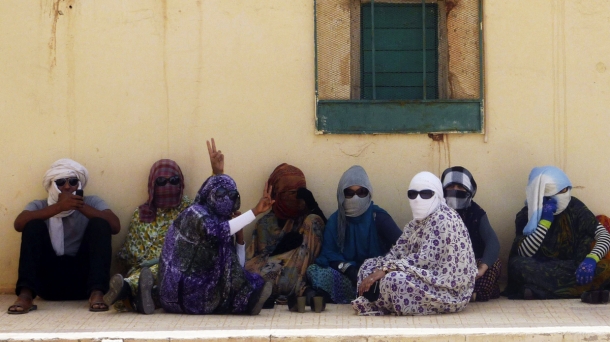World
Disputed territory
Compromise seen on Western Sahara allowing UN mission extension
Reuters
Paris
Western Sahara is the focus of Africa's longest-running territorial dispute, between Morocco and pro-independence Polisario guerrillas. The resolution is due to be voted on April 25.
-

Tindouf. Photo: EFE
The United States has dropped demands for human rights observers in Western Sahara, diplomats said on Tuesday, paving the way for a compromise that would allow the U.N. mission in the disputed territory to be extended for another year.
Western Sahara, a tract of desert the size of Britain that has lucrative phosphate reserves and potentially offshore oil, is the focus of Africa's longest-running territorial dispute, between Morocco and pro-independence Polisario guerrillas.
A U.S.-drafted resolution that proposed installing United Nations peacekeepers to monitor human rights abuses had angered Morocco, and taken its traditional protector France by surprise.
"There will be a resolution very soon for a new mandate of the MINURSO," French Foreign Ministry spokesman Philippe Lalliot told reporters, referring to the mission's acronym. "We are close to a solution that will satisfy everybody."
Lalliot declined to comment on the details of the resolution, which was due to be voted on April 25.
But three Western diplomats said Washington had withdrawn the demand after its resolution was reviewed by a group of countries including the United States, France, Spain, Britain and Russia.
"The Moroccans will be satisfied," said one diplomat. A U.N. Security Council diplomat said that the draft resolution contained more human rights language than previous years, describing it as a "step forward."
It encourages enhanced efforts and progress on human rights but does not propose that U.N. peacekeepers monitor them, said the diplomat, who spoke on condition of anonymity. The United States' U.N. mission had no immediate comment.
Conflict dates to 1970s
The dispute dates back to 1975 and pits Morocco, which asserts that the region to its south is part of its territory, against the Algeria-backed Polisario Front movement.
Morocco holds about 80 percent of the territory and the Polisario the rest, including refugee camps.
Europe and the United States say their worry is that the conflict is souring relations between Morocco and Algeria and preventing them from working together against Islamist violence.
While allegations of abuse have lessened since a 1975-1991 war, rights groups like Amnesty International accuse Morocco of continuing to use excessive force against demonstrators and activists and repressing political freedom, among other abuses.
Morocco and France, its former colonial ruler, have resisted the idea of peacekeepers reporting on rights abuses in Western Sahara, and Paris has long supported Rabat's position due to historical and business relations.
The United Nations brokered a ceasefire settlement in 1991 between Morocco and the Polisario with the understanding that a referendum would be held on the region's fate. But the referendum never took place and attempts to reach a lasting deal have foundered.
A Moroccan official, who confirmed the latest U.N. draft would "encourage human rights", said he expected Algeria and Polisario allies to lobby for changes in the next two days.
A senior Polisario official told Reuters the group was struggling to prevent its youth from taking up arms after seeing years of failed talks and ongoing rights abuses. "This (compromise) is a big mistake that shows to the Sahrawis that their pacifism isn't leading to anything. It's a shame," said Paris-based Omar Mansour, a member of the Polisario's National Secretariat decision-making body.
U.N. Secretary-General Ban Ki-moon has warned that the conflict in Mali, where France deployed troops and air power to oust Islamist rebels, threatens to spill into Western Sahara.
top stories



-
news
New anti-eviction law
Andalucia begins proceedings to seize confiscated houses from banks
-
news
London attack
British police ponder conspiracy after soldier murder
-
Sport
Giro d'Italia
Nibali tightens grip on overall lead after stage victory
-
Sport
Spanish soccer league
Real Sociedad, Valencia resume duel for last Champions League ticket
-
Sport
Giro d'Italia
Nibali tightens grip on overall lead after stage victory
© EITB - 2024 - Privacy Policy - Legal disclaimer - Cookie Policy - Cookie settings


